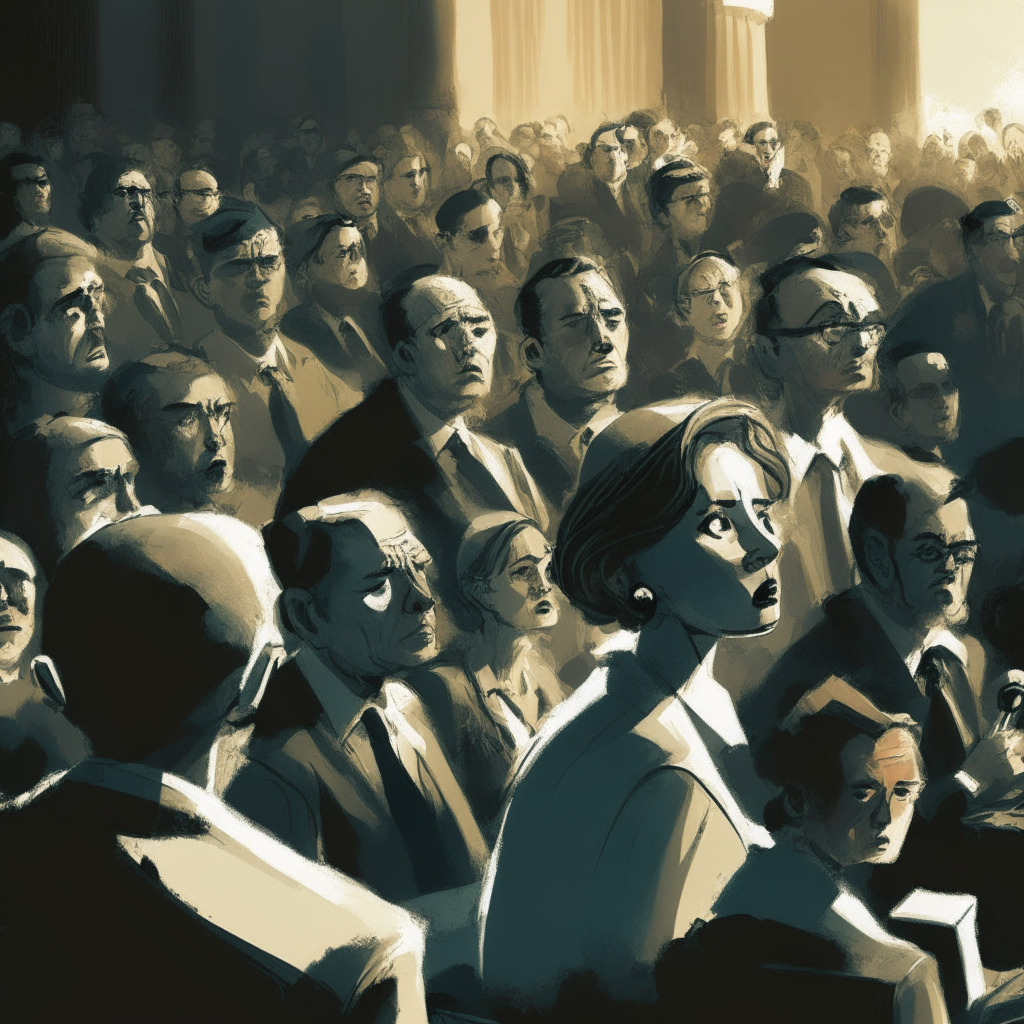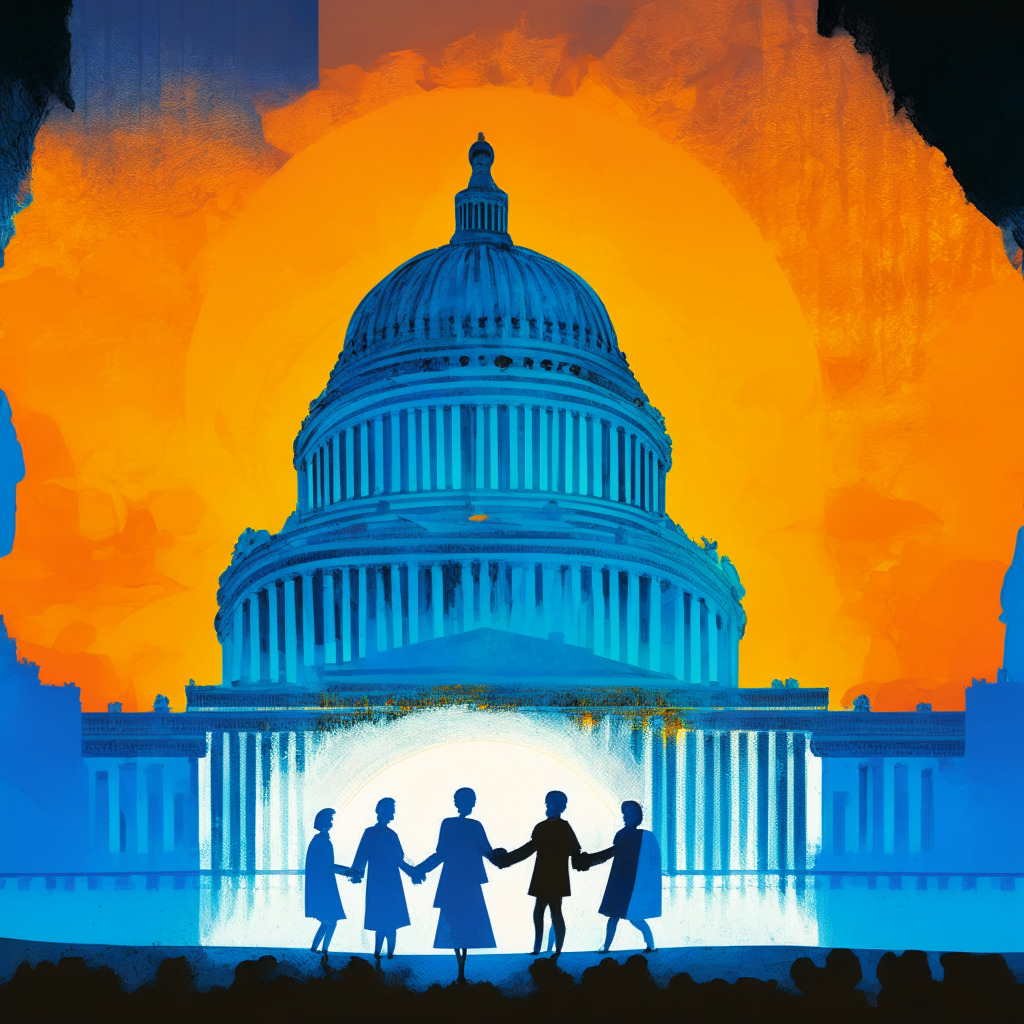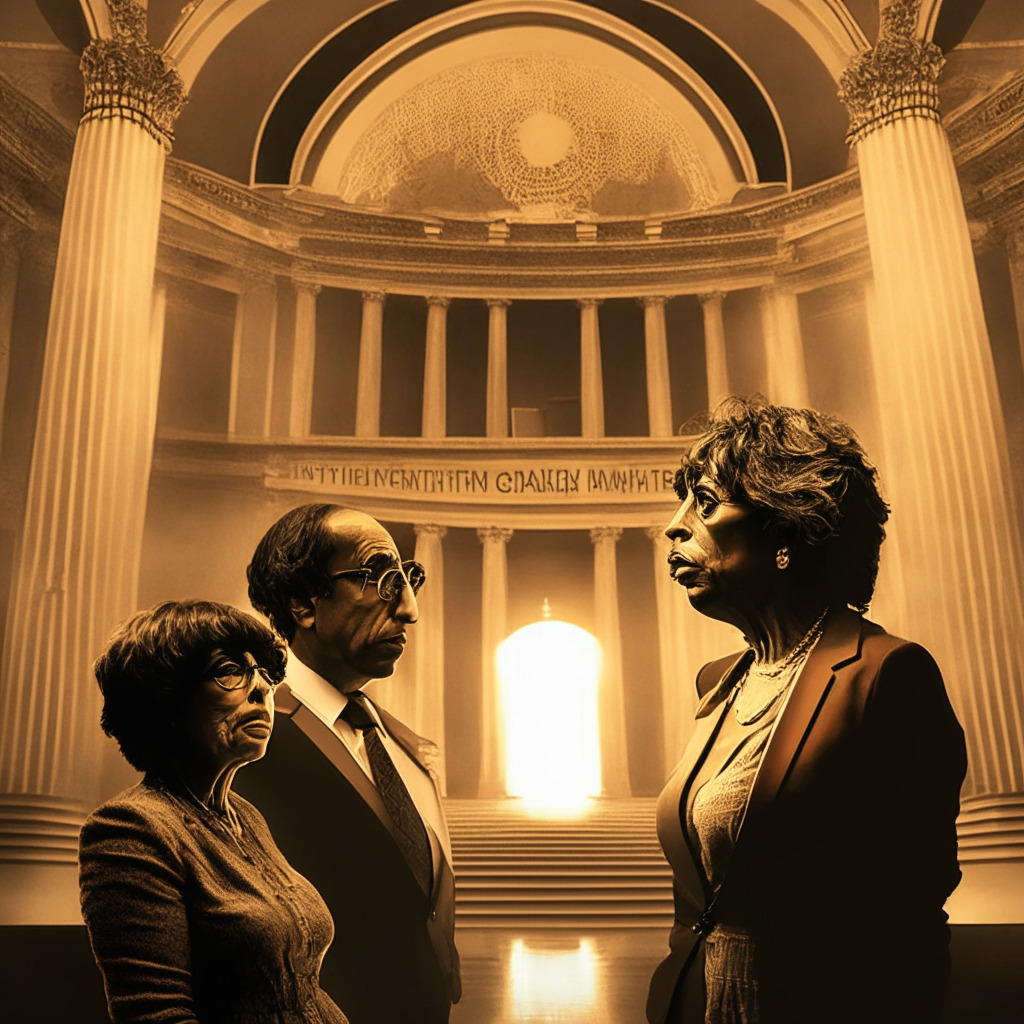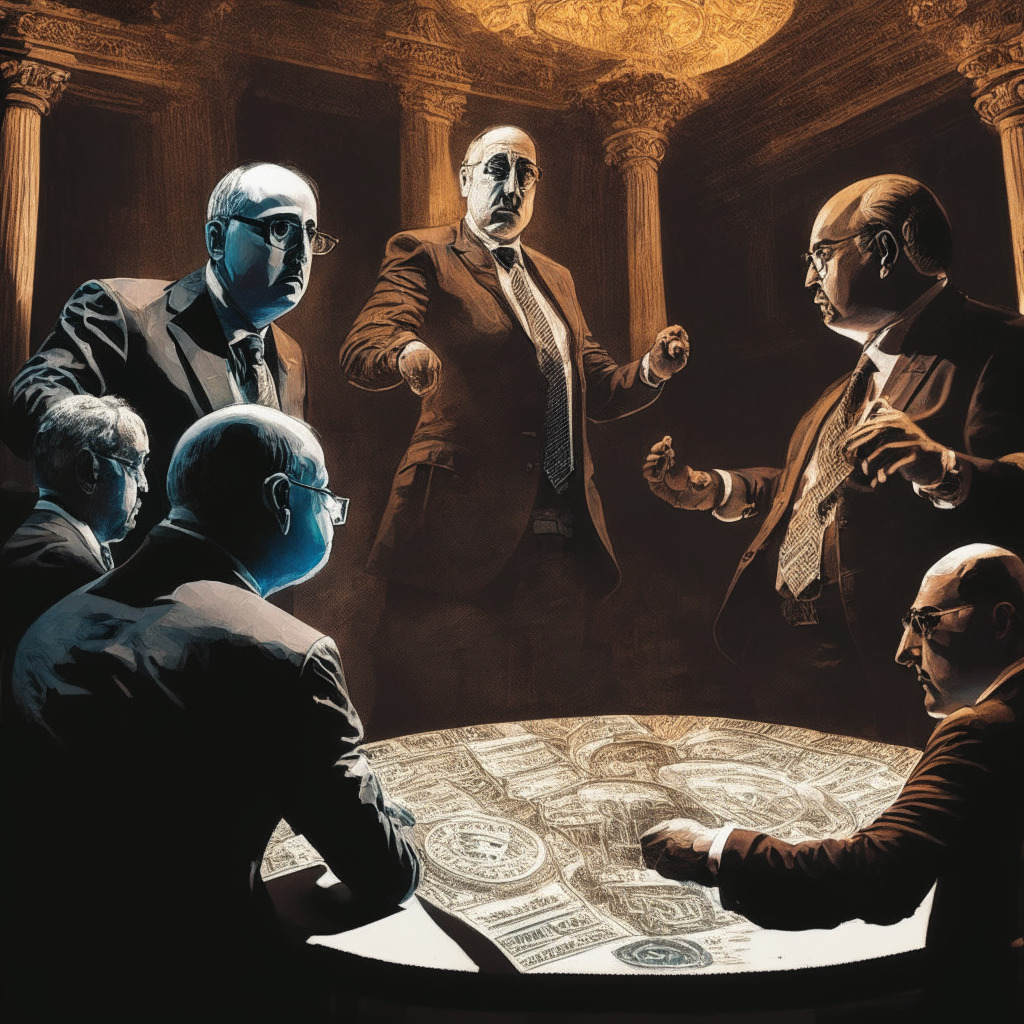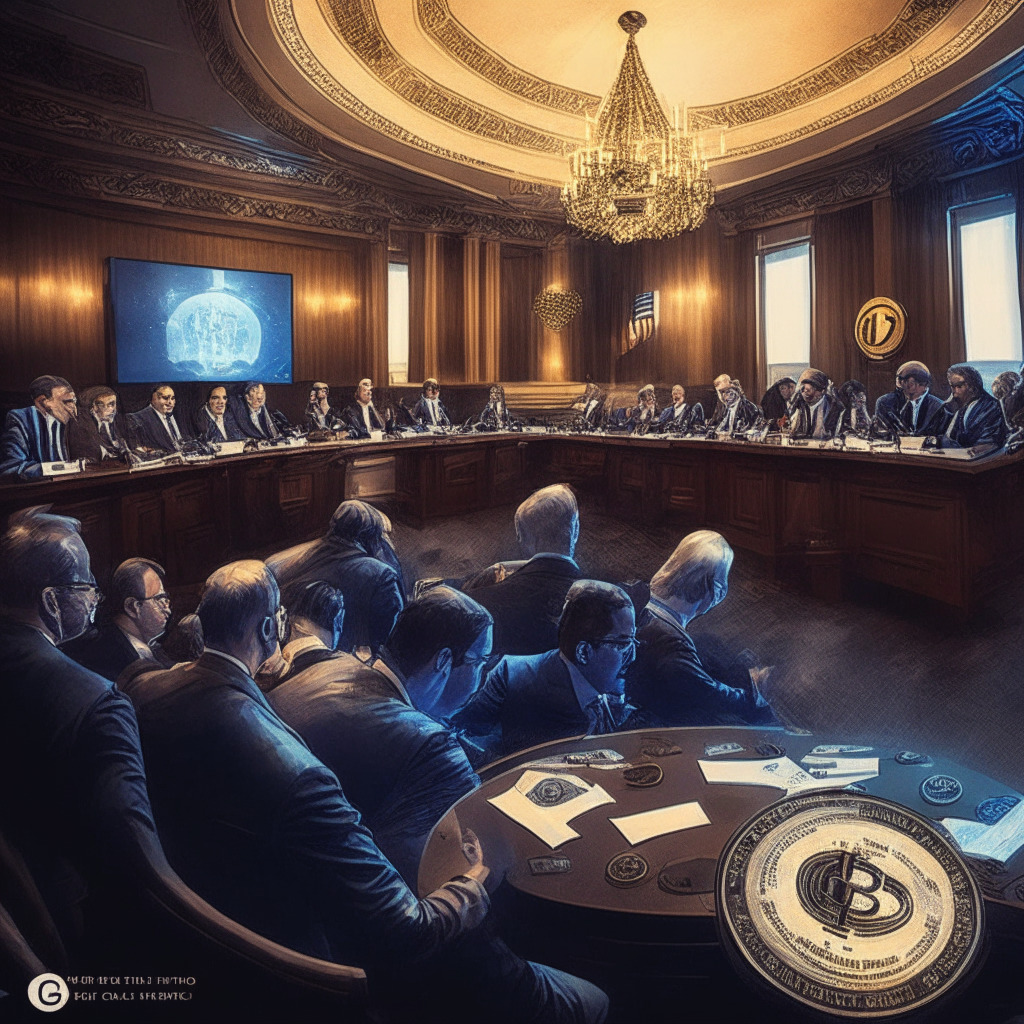The United States Financial Services Committee has scheduled a hearing on June 13 titled “The Future of Digital Assets: Providing Clarity for the Digital Asset Ecosystem.” It aims to discuss critical issues concerning digital assets and provide clarity for the crypto community.
Search Results for: Financial Services Committee
CBDC Anti-Surveillance State Act: Preserving Financial Privacy in the Age of Digital Currencies
U.S. Representative Tom Emmer, with the support of 49 other Republican representatives, reintroduced the CBDC Anti-Surveillance State Act to prevent unjust financial surveillance through retail central bank digital currencies (CBDCs). Advocates contend such government-sanctioned currency must respect financial privacy, individual freedom, and market competitiveness.
Reshaping America’s Financial Future: The Digital Dollar Dilemma and Road to CBDC Regulation
The House Financial Services Committee is preparing to discuss the implications and regulation of a digital dollar or Central Bank Digital Currencies (CBDCs), along with private sector alternatives. This conversation, following various states erecting legislative boundaries for CBDCs and $41 million hacking of a crypto site, underlines the need for balance between innovation and robust regulatory frameworks.
Cryptocurrency Regulation in the UK: Gambling or Financial Services? Exploring Lawmakers’ Divide
U.K. lawmakers are divided on cryptocurrency regulations, with some suggesting treatment like gambling, while others support existing financial services regulations. The All Party Parliamentary Group (APPG) for crypto assets supports the government’s proposal, citing effective tax collection and robust consumer protections associated with financial services regulations. The debate continues as U.K. lawmakers seek a balanced approach for a safe and secure crypto market.
SEC’s Crypto Transparency Under Fire: Will Gensler Meet Committee’s Deadline?
The House Financial Services Committee accuses SEC Chair Gary Gensler of avoiding requests for information on cryptocurrency-related matters, resulting in threats of a hearing. Committee members demand clarification on digital asset exchanges registration and whether ether is a security or commodity. Regulatory clarity and open communication are crucial for the growing crypto market.
US House Committee Seeks Crypto Clarity Amid SEC Contradictions and Offshore Exodus
The U.S. House Financial Services Committee aims to clarify digital asset regulations amid contradictory actions from SEC Chair Gary Gensler. As U.S.-based crypto firms consider moving offshore due to regulatory crackdowns, upcoming hearings will address regulatory gaps and potential coordinated efforts by regulators for “Operation Choke Point 2.0” to de-bank the crypto market.
Consensus 2023 Recap: Crypto Regulation, Election Impact, and Financial Milestones
The Consensus 2023 conference and Congressional hearings discussed critical cryptocurrency issues, including policy developments and the unclear delineation between securities and commodities. Upcoming legislation and the 2024 presidential election’s impact on crypto policies remain key subjects, as the industry navigates regulatory complexities and continues to grow.
Title: Crypto Clash in Congress: U.S. House Committees to Embark on Unprecedented Joint Hearings for Digital Assets Regulation
The U.S. House of Representatives is taking major strides towards addressing digital asset regulations as […]
Navigating the Regulatory Maze: Driving Stablecoin Legislation Under Biden’s Administration
Chair Patrick McHenry of the US House of Representatives’ Financial Services Committee affirms his commitment to regulate stablecoins. He steers two digital asset bills targeted at stablecoin regulation, and bringing clarity to the role between the CFTC and SEC. McHenry highlights potential bipartisan support and the global influence of dollar-denominated stablecoins, emphasizing complex power dynamics beyond the digital asset scope.
Crypto Regulatory Suspense: SEC’s Stance, Stakeholder Worries, and an Uncertain Future
“The U.S. House Financial Services Committee may subpoena the SEC over undisclosed documents related to FTX’s former CEO. The Committee claims the SEC’s lack of cooperation is compromising transparency and hindering digital asset ecosystem growth. This case demonstrates how regulatory bodies are scrutinizing the digital asset industry.”
US Central Bank Digital Currency: Speed of Transaction vs Privacy Concerns
“The United States House Financial Services Committee is considering further restrictions on a central bank digital currency (CBDC). Critics argue that a CBDC would centralize control, contradicting the philosophy behind cryptocurrency, and posing potential privacy risks. Despite some progress, the future of a U.S. CBDC remains uncertain.”
Battleground CBDC: A Bipartisan Struggle Shaping Cryptocurrency’s Future in the U.S.
The House Financial Services Committee introduced three bills halting the Federal Reserve’s considerations towards a Central Bank Digital Currency (CBDC). Republicans expressed fears over the potential impact on traditional banking and the suspense it could cast on the stablecoin market. Democrats, however, pushed for continued CBDC exploration, reminding of its potential benefits in global economic competition. The Federal Reserve reaffirmed its cautious approach towards CBDC, emphasizing concerns over a stablecoin issuance without federal control.
The Clash Over PayPal’s Stablecoin: Balancing Innovation and Regulation
“The U.S. House Financial Services Committee offers contrasting viewpoints on PayPal’s U.S. dollar-pegged stablecoin, PYUSD. While Rep. Maxine Waters expresses concern about regulatory oversight, Rep. Patrick McHenry proposes potential in its development. The struggle between fostering innovation and ensuring safety shows the complex challenges of the crypto industry.”
Stablecoin Bill Approval: Bipartisanship Triumph or Political Posturing?
The recent passing of the stablecoin bill in the House Financial Services Committee highlights ongoing political tension in Washington. Despite initial bipartisan support, the bill stands as a glaring representation of political unity’s failure, caught in the crossfire of political maneuvers, with even well-intentioned legislation teetering on the edge of oblivion.
Sweeping U.S. Regulatory Acts: Crypto Advancement or Investor Risk?
The House Financial Services Committee approves a bipartisan bill, Financial Innovation and Technology for the 21st Century Act, aiming to provide regulatory clarity for cryptocurrencies. The Act delineates registration requirements for crypto firms and seeks to define if a cryptocurrency is a security or a commodity, extending the CFTC’s control over the crypto industry.
Legal Clash in US Crypto Regulations: Republicans and Democrats Weigh In
The House Financial Services Committee advances two crypto-related bills aimed to address blockchain-related dilemmas and establish a solid legal framework. Despite opposition, proponents claim these bills will prevent the U.S.’s lag in crypto regulation and provide clarity within the digital asset industry. However, skeptics express concern over potential diminished investor protection and misuse of power imbalance.
Crypto Regulation in the US: Balancing Innovation and Consumer Protection
“The US House Financial Services Committee is examining legislation for regulatory clarity in the crypto and blockchain space, including the Financial Innovation and Technology for the 21st Century Act. Critics are concerned about potential favoritism towards cryptocurrency firms over consumers and the possibility of mishandling customer funds. Regardless of outcome, there’s widespread acknowledgment of the urgent need for comprehensive cryptocurrency regulation.”
Bipartisan Agreement on Stablecoin Regulations: A Hopeful Step or Potential Roadblock?
The Republicans and Democrats have found consensus on proposed stablecoin regulations, with the Financial Services Committee targeting state-wise legislations. The bill tasks the US Federal Reserve with enforcing regulations and could give the Commodity Futures Trading Commission more oversight over cryptocurrencies. The state vs federal regulation issue may present future challenges.
Digital Asset Market Structure: A Path for Crypto Regulation or Hindrance to SEC’s Authority?
House Financial Services Committee Chair Maxine Waters proposed the Digital Asset Market Structure bill, offering US-based digital asset exchanges a pathway for SEC registration, seeking regulatory clarity for the crypto industry. The legislation aims to approve digital securities, commodities, and stablecoins for trading while providing guidelines to distinguish between crypto-based securities and commodities.
Stablecoins, CBDCs, and the Future: Balancing Innovation, Privacy, and Regulation
Federal Reserve Chair Jerome Powell addressed digital assets, stablecoins, and central bank digital currencies (CBDCs) during a recent House Financial Services Committee. Stablecoins offer efficient, cost-effective payments with stability, but concerns over privacy and regulation arise. Powell suggests CBDCs would be intermediated through banks, not individuals’ accounts, sparking ongoing debates on financial institutions’ role and the future of digital currencies.
US Lawmakers Target Banking Failures: Impact on Crypto and Blockchain Industries
In response to major banks’ failures, US lawmakers from the House Financial Services Committee have introduced a series of bills, although not specifically mentioning crypto or blockchain. The future of regulations surrounding banks and their potential impact on the cryptocurrency and blockchain industries remain uncertain, with past lawmakers expressing optimism on stablecoin bills.
US SEC vs Crypto Industry: McHenry’s Stance Sparks Debate on Fairness & Future Regulations
Financial Services Committee Chairman Patrick McHenry indirectly supports BlackRock iShares spot Bitcoin ETF and criticizes the SEC’s regulation approach to the digital asset market. The upcoming hearings and committee vote on a digital asset bill may impact the crypto market, clarifying regulations and jurisdiction between the SEC and CFTC.
SEC’s Crypto Rule Change: Balancing Innovation and Regulation in a Complex Landscape
The complex regulatory landscape surrounding the crypto industry faces pushback from House Financial Services Committee Republicans, who urge the SEC to rescind a proposed rule change on defining “exchange.” Opponents argue that the SEC’s overreach hinders innovation and technological advancements within the digital asset ecosystem, further impacting the broader U.S. economy.
Regulation Debate: SEC’s Approach Limits Crypto Exchange Accessibility & Impedes Token Functionality
The House Financial Services Committee discussed regulation of digital asset markets, focusing on crypto market structure and stablecoin regulation. Aaron Kaplan, CEO of Prometheum, stated that existing securities laws suffice for crypto regulation, echoing SEC Chair Gary Gensler’s viewpoint. However, some argue that the SEC’s current approach doesn’t provide a clear path for crypto exchanges.
Upcoming Digital Asset Bill: Balancing Regulation, Innovation, and Investor Protection
The US Financial Services Committee will vote on a digital asset bill to establish a regulatory framework for the crypto industry, providing clear rules and guidelines. The intended outcome is to offer clarity and take the first step towards regulating crypto in the US, addressing issues related to the SEC’s regulation-by-enforcement approach.
Digital Asset Market Structure Draft: Striking the Balance Between Regulation and Growth
US House Financial Services Committee Chair Patrick T. McHenry announced a vote on the Digital Asset Market Structure Discussion Draft to classify cryptocurrencies as securities or commodities and regulate exchanges. However, concerns arise due to potential “provisional registration” that could reward bad actors in the industry with a “get out of jail free card.”
Bipartisan Stablecoin Bill: Impact on US Crypto Landscape, Regulation, and Innovation Pros & Cons
The US House Financial Services Committee released a draft stablecoin bill, aiming to bring clarity on the digital asset market structure and regulation of payment stablecoins. The bill includes detailing primary federal regulators, regulations on issuing payment stablecoins, supervision, enforcement, and interoperability. The proposed legislation gives federal agencies more authority and oversight of stablecoins, as a first step toward regulating cryptocurrency in the US.
Bipartisan Stablecoin Regulations: Growth Catalyst or Innovation Stifler?
The House Financial Services Committee’s new draft legislative proposal for stablecoin regulations in the U.S. aims to establish bipartisan consensus. This legislation could bring clarity to the crypto market, however, concerns about increased oversight hindering innovation arise. Democrats’ stance on the current version remains unclear.
Cryptocurrency Clarity: June 13 Hearing, Regulation, and Market Impact
The upcoming U.S. House Financial Services Committee hearing on June 13 could bring clarity to the cryptocurrency market, addressing regulatory compliance, investor protection, and market stability. Proposed legislation may regulate crypto assets and exchanges, stabilizing markets and fostering industry advancements. Investors are eyeing various cryptos amidst these developments.
Upcoming Hearing on Digital Assets: Balancing Clarity, Regulation, and Innovation
The House Financial Services Committee has announced a hearing on June 13th, titled “The Future of Digital Assets: Providing Clarity for the Digital Asset Ecosystem.” Amid an SEC crackdown, Republican lawmakers propose a draft bill for clearer crypto guidelines, seeking a balance between investor protection and innovation in the rapidly evolving digital asset ecosystem.
Pathway to Digital Commodities: Balancing Innovation and Regulatory Compliance in Crypto
The draft bill by the United States House Financial Services Committee and House Agriculture Committee proposes a pathway for certain crypto assets to be labeled as digital commodities, offering regulatory clarity for crypto firms. However, it also raises concerns over digital assets’ classification and potential limitations due to increased regulatory measures.
Bipartisan Efforts for Clear Digital Asset Regulations: Can SEC and CFTC Find Common Ground?
Two Republican lawmakers from the US House Financial Services Committee and the House Agriculture Committee are working on a discussion draft to regulate digital assets, aiming to establish clarity in determining when a digital asset is considered a security. The draft legislation, “Digital Asset Market Structure Discussion Draft,” proposes a process for treating digital assets and seeks a unified path for SEC and CFTC jurisdictions.

